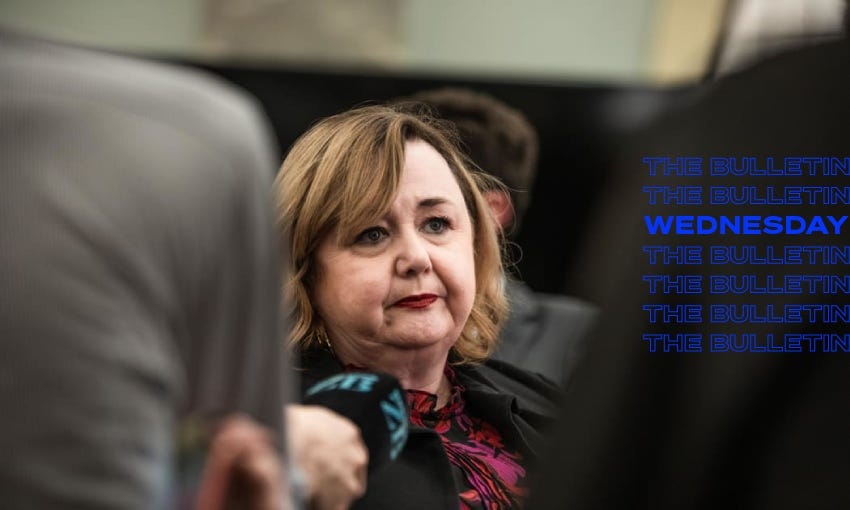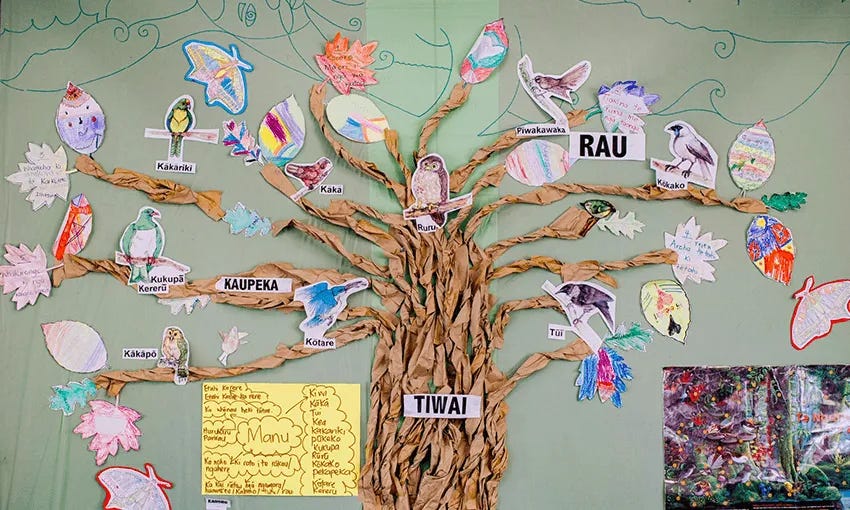What is the Gib crisis anyway?
Outside the building and construction industries, many people won’t have given Gib a passing thought. Now it’s hitting the headlines on a daily basis. What’s going on?
Mōrena and welcome to The Bulletin for Wednesday, June 22, by Anna Rawhiti-Connell. Presented in partnership with Z Energy.
In today’s edition: minister gives reason for health system pressures; government won't apologise to Grounded Kiwis; council to meet on plan for 73,400 houses in Wellington; but first, a 101 on the Gib shortage.
Megan Woods launches a plasterboard taskforce (Photo: RNZ/Samuel Rillstone)
What you need to know about the Gib shortage
In this job I am something of a jack of all trades, master of none. Being honest, I am neither jack nor master on the Gib shortage and today has required some deep diving. I’ve watched the issue build from the periphery, talked about by expert journalists and commentators, but now it's on every homepage, Reddit and in my Instagram feed. Searches on Google for “gib shortage nz” have risen by more than 5000% in 12 months. I thought I’d outline why you suddenly need to know about Gib if you don’t already. To start, Stuff’s Melanie Carroll has a brief explainer on the current Gib shortage.
What is Gib? (a revealing look at my Google searches yesterday)
There’s a high chance that the interior walls around you right now are made of Gib. It’s plasterboard. Gib is specifically the name of the product made here by Winston Wallboards, which is owned by Fletcher Building. Winston Wallboards has a 94% share of the plasterboard in New Zealand. That grip has been under investigation by the Commerce Commission as part of a wider look into competition for key building materials, with a report due out next month. There is additional paperwork needed to substitute Gib for a generic plasterboard when getting building consents approved. Auckland Council is now approving many substituted building products during the consent process to help during the shortage.
Gib theft, opportunism and real pain for building companies
The shortage is the result of disruptions caused by lockdowns and a record amount of building. Delays in getting Gib are causing building companies to fold. Costs of building supplies rose 34% in the twelve months to March, according to industry player EBOSS. There are accusations of hoarding as stacks of Gib ordered a while ago sit on building sites. Fletcher Building has violated its own policy on preferential stockpiling of the product. Someone is currently selling single Gib boards for $410 on TradeMe when they’re normally $29.50 at a hardware retailer. Someone else was offering a $5000 reward for the return of Gib stolen in Wainuiomata recently. Stuff reported in May that Auckland building companies were being targeted in a run of Gib theft.
Shortage prompts government to launch plasterboard taskforce
Suffice to say the industry and some investors aren’t happy. As mentioned in The Bulletin last week, Kiwisaver provider Simplicity is particularly irked and has been attempting to import plasterboard from overseas for its building arm, Simplicity Living. It met with Fletcher Building last week. As Rewiti Kohare reports, Simplicity has also been hampered by the trademarking of plasterboard colours by Fletcher's. Simplicity is now calling for heads to roll at Fletcher Building. Not everyone is down on Fletcher Building, as BusinessDesk’s Jenny Ruth (paywalled) writes, with one analyst asking “Should any company be expected to hold excess capacity for a short period of time when demand is way outstripping a normal demand pattern?” The shortage has reached the corridors of power, with building and construction minister Megan Woods announcing yesterday that a plasterboard taskforce is being set up to investigate the shortage. This received a round of sarcastic applause from the opposition in the house.
Chinese Languages in Aotearoa is a project created by Te Papa to highlight the complexity of cultural identity within Chinese New Zealand communities. To learn more about the project read our interview with curator Grace Gassin. In partnership with Te Papa, featured above is a panel from a new short comic created for the project by Mengzhu Fu (傅梦竹).
“Growing up, I had this complex about not being a “true” Chinese person because I didn’t speak a Chinese language. The only ones [in my family] who spoke Cantonese were my grandparents, who lived in another city. When they passed away, in a sense so did my connection to the language … Now, even though I can only speak Mandarin like a pre-schooler, I can teach my son some basics and give him a foundation. I hope my little sixth-generation Chinese-New Zealander will be more confident in who he is and appreciate his connection to the previous five.” Koreen Liew-Young (杨凯贤)
To read the full story, click here. (Sponsored)
Minister provides explanation for current health system pressure
Health minister Andrew Little has said the pressure on the health system is the result of the flu season starting earlier than expected and less of a dropoff in Covid cases than expected. Hospitals had predicted a flu spike in late June and throughout July with the minister saying “Things have happened outside their predictions”. One hospital is seeing a fourfold increase in flu patients, while hundreds of health workers are out sick due to winter illness. Reporting on rising cases of the flu began in late May with Dunedin one of the first places to be hit by it. I would expect some pushback from the health sector on how well we’ve planned for the flu season, with seemingly incremental expansions of vaccine eligibility despite warnings last year that the influenza vaccine should be added to the schedule of vaccines for all children. The government announced yesterday that it is looking at making the vaccine available to more people.
Government won’t appeal Grounded Kiwis decision
Appealing the decision was ruled out yesterday by Covid-19 response minister Ayesha Verrall after the government received legal advice on Monday. It has not committed to an apology. Verrall said: “We know the MIQ process was tough on people but it was essential in keeping New Zealanders safe." Act’s David Seymour has responded, saying “The decision not to appeal the Grounded Kiwis case is an admission the government got it wrong”. The judgement referred to a specific part of the MIQ process – the lobby system. Verrall said the government has "continuing engagement with the Grounded Kiwis group as a result of that legal action". The government is now reviewing how emergency spots in MIQ were granted, including pregnancy-related applications.
A vital message from The Spinoff’s publisher, Duncan Greive:
If you’re reading this, you’re hopefully getting value out of The Spinoff. Yet like many publishers, The Spinoff has suffered a significant drop in members, despite our costs continuing to increase. On one level I understand why our membership has dropped away. There’s a cost of living crisis, and inflation has made life hard for many of us. It’s totally normal to feel like you don’t need to support your local media organisation at a time like this.
The promise we’re making to you is that we’re actually better-suited to times like this than the pandemic itself. Our plan is to return to something more of what made us – coverage of culture, politics, te ao Māori and more with heart and humour. We will do that with features, essays and opinion pieces, but also podcasts, comics, video and newsletters. We are here to help walk you through this fascinating new era, and feel well-suited to being your guide.
But we can’t do it without you. The Spinoff has been cut out of the government’s enormous $100m plus Covid-19 campaign, which has been a boon to the big media companies and social media platforms. We returned the wage subsidy, unlike almost every other media organisation. The public interest journalism fund was narrowly targeted and is winding down. The big tech companies are refusing to do what they did in Australia and make meaningful deals with local media. And the recessionary drums continue to beat loudly, impacting the commercial spend we rely on, along with you, our members.
All of which is to say that we need your support more than we ever have. So please, if you can, click here to support The Spinoff by becoming a member today.
Plan to build an additional 73,400 houses in Wellington back on debating table
As Stuff’s Erin Gourley reports, Wellington city council will meet tomorrow to discuss the 1281-page district plan for the city. The plan is focused on intensification and would allow for the building of an additional 73,400 houses in Wellington over the next 30 years. As RNZ’s Kirsty Frame reports, between 50,000 to 80,000 people are expected to move to Wellington in the same time frame which, without changes, would create a shortfall of 4600 to 12,000 homes. The plan will allow buildings of up to 12 storeys in the central city, and up to 10 storeys at the centre of suburbs like Johnsonville. Councillors are hoping the meeting doesn’t go into the night. Last year’s spatial plan meeting ran until 9pm. Good luck.
Got some feedback about The Bulletin, or anything in the news? Get in touch with me at thebulletin@thespinoff.co.nz
Kaiārahi i te reo play a vital role in supporting te reo Māori and tikanga in the education system. Charlotte Muru-Lanning reports on a historic win for the workforce in the form of pay equity settlements. Alice Webb-Liddall profiles professor Rangi Mātāmua, aka "Matariki Man". And from the first edition of our new business newsletter Stocktake, Chris Schulz explores why everyone is so short-staffed right now. Te Kuru o te Marama Dewes meets an artist exploring Māori concepts of time and space by creating detailed star maps – part of an ongoing pursuit to see the world the way our ancestors did.
NZR reimagines rugby but is it based in reality?
Madeleine Chapman attended the launch of New Zealand Rugby’s (NZR) strategic plan for the next four years yesterday. Her account of it is emblematic of the challenges NZR is facing as it balances commercial imperatives, access to talent, falling numbers for the men’s game, head injury risk and a fan base desperate to be engaged in a more personable and intimate way. As Chapman reports, “invited guests of New Zealand Rugby stood the width of a field away from the players as they mostly stood in a team huddle.” Though participation numbers for the women's game are rising and we will host the world cup this year, the Black Ferns didn’t make the cover of the “Reimagining Rugby” report and the world cup garnered only a passing mention from NZR CEO, Mark Robinson. There was an appearance from the new digital Black Fern, Maa, so some imagining has been done but whether it’s based in the reality fans want to see the NZR live in, or something purely virtual, remains to be seen.
Peter Thiel helped build it but now wants to tear it down
"The left wants a villain. The right wants a sugar daddy."
For today's long read, a piece from the Washington Post’s Elizabeth Dwoskin (republished on Stuff) about New Zealander Peter Thiel. Thiel was an early investor in Facebook but left the board earlier this year. At the time, there were reports that he was leaving to fulfil political ambitions in the Republican party. Dwoskin debunks this, saying: “his departure was years in the making, driven by a growing philosophical rift between Thiel and Facebook as conservatives became uncomfortable with the tech industry's willingness to police online speech.”
In related news Thiel has agreed to dispense with a planned meditation pod as he seeks resource consent for a very large house in Wanaka. Thiel is appealing a decision by the Queenstown Lakes district council who have declined consent.











